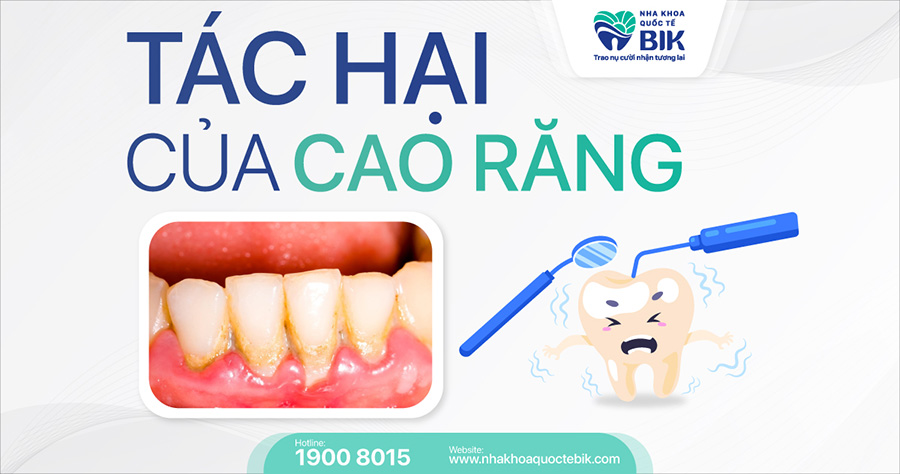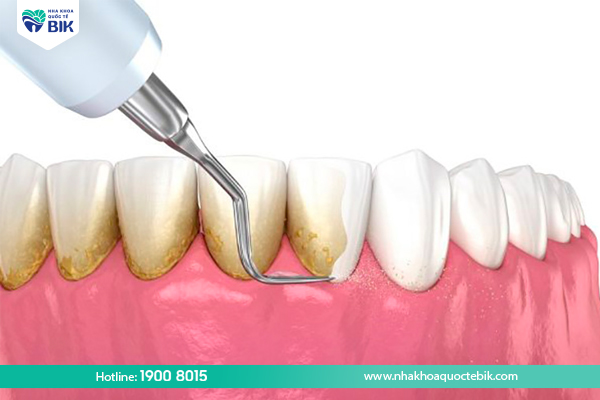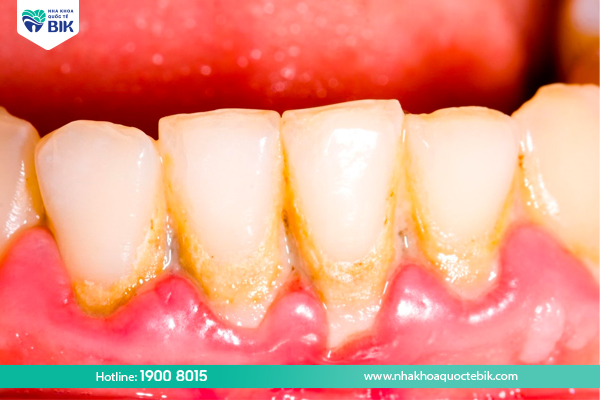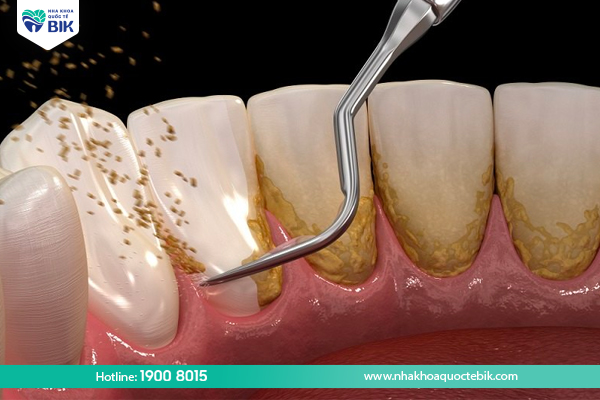
Dental tartar is formed due to the calcification of food plaque left in the oral cavity for a long time without being cleaned. They often exist between the tooth root and the gum, so it is very difficult to clean at home. Scaling teeth at a reputable dental clinic is the only way to prevent the harmful effects of dental tartar.
1. What is dental tartar?

Dental calculus, also known as dental calculus, is essentially plaque that has accumulated in the oral cavity for a long time and is calcified by inorganic salt compounds in saliva and soft residue. The plaque will gradually harden, adhere to the enamel, especially the contact line between the teeth and gums.
Dental calculus is usually opaque white to light yellow and can be dark yellow in smokers. In addition, there are cases where calculus causes gingivitis, the inflamed area will secrete inflammatory fluid and bleed, the blood will seep into the calculus and form a reddish-brown color.
With the characteristic of firmly adhering to the base of the tooth, calculus cannot be removed at home with a toothbrush or anything else because if done incorrectly, it can cause direct damage to the teeth and gums. At this time, dental clinics are the only place where you can have your tartar completely cleaned with specialized tools.
2. What are the harmful effects of tartar?

At first, tartar may only be a thin layer and does not cause much effect, but over time it will accumulate more and more and cause some of the following harmful effects:
2.1. Loss of aesthetics
Tartar is often yellow and quite different from the color of real teeth, so its formation and accumulation on the tooth surface will cause loss of aesthetics. Therefore, many people gradually lose confidence when communicating because others will easily notice tartar.
2.2. Difficulty in oral hygiene
Tartar plaque often exists at the edge between the teeth and gums or close to the teeth, so oral hygiene at this time will be much more difficult. Even if customers use dental floss to get between the teeth or use a toothpick, it is very difficult to clean food debris stuck in tartar.
2.3. Bad breath
Bad breath is a fairly common problem that makes many people lose confidence when communicating. Bad breath is caused by special bacteria that exist in tartar. If the condition is severe and lasts for a long time, brushing your teeth normally or using a fragrant mouthwash can only help to overcome it for a certain short period of time.
2.4. Gingivitis and other oral diseases
When tartar accumulates for too long, it will create favorable conditions for bacteria to attack the gums and tooth roots, causing a number of other oral diseases, especially gingivitis.
Gingivitis is a fairly common condition with symptoms of swollen, red and bleeding gums. This condition, if not treated for a long time, can lead to periodontitis, over time the gums will no longer be strong enough to hold the teeth, causing the teeth to loosen or even lose teeth.
3. Measures to prevent tartar?

To prevent tartar formation, customers should pay attention to the following in their daily oral care, especially oral hygiene:
3.2. Proper oral hygiene
– Brush your teeth at least twice a day, especially after each meal, with a soft-bristled toothbrush with moderate brushing force to avoid damaging the gums and other soft tissues in the oral cavity.
– Replace your toothbrush every 3-4 months to prevent bacteria from accumulating and causing inflammation.
– Combine the use of dental floss, water flossers and mouthwash to completely remove bacteria and food debris in the gaps between teeth, preventing tartar from forming.
3.3. Reasonable diet
– Regularly eat lots of green vegetables, fruits, or foods rich in calcium from meat, fish, shrimp, eggs, milk, etc. to help strengthen teeth.
– Drink plenty of water to clean the oral cavity, limit plaque from forming tartar.
– Limit the use of foods containing a lot of sugar because they are easily converted into tartar when exposed to the oral environment.
– Limit eating foods with high stickiness to avoid difficulty in oral hygiene.
3.4. Regular scaling
Customers should visit the dentist and have their teeth scaled periodically at least once every 6 months to avoid the situation where tartar forms too thickly, making cleaning difficult. When removing tartar, the doctor can also detect other oral diseases and provide timely treatment options.
4. Harmful effects of improper tartar removal

Although tartar removal is a fairly common and simple technique in the dental industry, improper tartar removal can cause certain harmful effects:
4.1. Soft tissue damage
Because tartar is often concentrated at the tooth root close to the gum, moving the tartar removal machine carelessly, even if just a little, can cause pain or bleeding in the gums.
4.2. Enamel erosion
The tartar layer often adheres very closely to the enamel, so if the doctor does not use the tartar removal machine skillfully, setting the vibration frequency too high will affect the enamel.
4.3. Cause infection
In case the tartar removal tool is not cleaned according to medical standards or the clinic does not ensure sterility, it can lead to infection or cross-infection between patients.
5. Where is a reputable and safe place to remove tartar?

BIK International Dental Clinic is proud to be one of the prestigious and safe dental addresses for scaling teeth by fully meeting the following criteria;
5.1. Team of good doctors
Although it is a fairly simple dental technique and is commonly provided at most clinics on the market today, to ensure safety, the doctor’s skills and experience are very important factors when performing scaling teeth.
When choosing services at BIK International Dental Clinic, customers will be consulted and have their teeth scaled directly by a team of highly skilled doctors. With more than 10 years of experience in the profession, the doctor’s operations are completely precise, careful, and absolutely painless for customers while the tartar is still thoroughly cleaned.
5.2. Equipped with modern tartar removal tools
All branches of BIK International Dental Clinic are equipped with the most modern and advanced ultrasonic tartar removal machines available today. The machine consists of a handle and a sharp tip that can move flexibly into each tooth gap. Normally, the machine will operate at a frequency of 28 – 30 Hz, causing tartar plaque to break off without affecting the gums or tooth enamel.
So tartar is mostly formed due to each person’s improper oral care habits. To clean and prevent the harmful effects of tartar, customers should choose tartar removal services at reputable dental clinics with a team of highly skilled doctors.


















